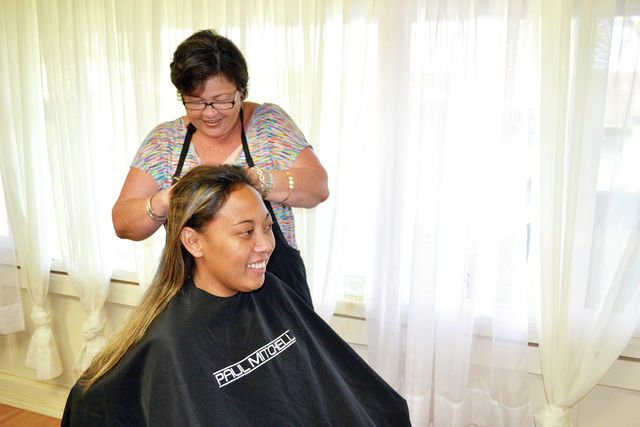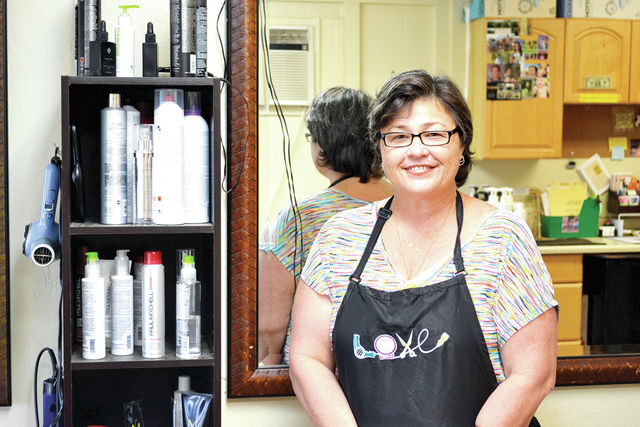ANAHOLA — After studying cosmetology on Oahu, Windy Kirifi opened her home for business in January 2015.
“I set up a chair and a shampoo bowl and a roll-about. That was it,” said Kirifi, owner of The Edge salon and manager of Anahola Marketplace.
With the help of Robin Danner, executive director of the Homestead Community Development Corporation, Kirifi secured a $20,000 loan and is now guiding others to be self-employed.
“You want to sign the front of the check not the back,” she said. “We concentrate more on our community because this is where we pilot everything.”
The Microenterprise Assistance Program, sponsored by HCDC, is funded by the U.S. Department of Housing and Urban Development as well as the County of Kauai, Danner said.
“A year ago, the Community Develop Block Grant program was announced by the county,” Danner said. “If we took low-income individuals on Kauai and gave them access to three components — business education, business capital and business location — we create a platform for local residents.”
The 18-week free program, which started in November, has 20 students. After training and developing a business plan, students have access to microenterprise loan capital between $5,000 and $50,000. They will also have access to a business location at Anahola Marketplace.
“It helps families, first and foremost. What can be more healthy for the community?” Danner said. “One business feeds off another business. Our spending dollars bounce around our economy more than once.
“This is about self-sufficiency and not bringing new industry in from the Mainland, but amplifying the talent and industry that’s hidden right here in our community.”
Prestan Rivera said he wasn’t in a good place several years ago, but is now hopeful of his future since joining the program.
“I’m going into landscaping. I know it’s hard work, but you need to keep pushing forward,” said the Anahola resident. “I didn’t know a lot of things: banking, writing a check. I learned by watching and listening. In life, there’s always more room to learn.”
Kirifi started her business in spring 2015. Her clientele, as well as her income, has almost doubled since then.
“The first year in business, I made maybe $30,000. This year, to be very honest, close to $60,000,” she said. “My loan was for $20,000 and I’m halfway through my loan already. We’re so afraid of debt as Hawaiians, but how are we going to live without debt?”
Kirifi admits it was frustrating at first.
“I was scared, but everything worthwhile you gotta have fear,” she said. “God is good and he has blessed my business. All I do is make the world beautiful one person at a time.”
Chanelle Hunter and her husband Ryan plan to open a skate shop.
“We’re trying to get ourselves started, other than working for others,” she said. “Seeing my aunty (Windy) starting her own shop and growing from something small to something big, it’s kind of rewarding at the end.”
Though Ryan was hesitant about the classes at first, his view has changed after several weeks.
“The more we got into the classes, he was like, ‘Come on, babe, let’s be there early,’” she said. “If they do ever bring it back up, take it because you’ll learn a lot and you’ll experience a lot with people on your level with you.”
Out of the 20 students, 17 of them are low-to-moderate income by HUD guidelines, Danner said, with an average annual income of $12,500.
“We all know visitors want authenticity. What is more authentic than local people providing meaningful services in that space?” she said. “There is absolutely no downside.”
On Thursday, the marketplace bought and placed a 40-foot Matson container. HCDC officials plan to renovate the container and create a retail space for the graduating cohorts.
“A lot of times microbusiness gets lost in the shuffle,” Danner said. “Microbusiness, to me, is a one- or two-man business whose goals maybe aren’t to become a millionaire, but maybe to provide for the family — make $60,000 to $100,000 a year instead of working for someone.”





